![]()
![]()
![]()
Use LEFT and RIGHT arrow keys to navigate between flashcards;
Use UP and DOWN arrow keys to flip the card;
H to show hint;
A reads text to speech;
61 Cards in this Set
- Front
- Back
|
Sociology
|
Systematic study of social interaction at a variety of levels.
Social behavior is regular and patterned. Groups, 2 or more people. They have a powerful influence and impact on us. |
|
|
Origins of Sociology
|
Born out of social change in Europe 18th-19th
"Perfect Storm"-Industrialization, Growth of Cities and Political change. |
|
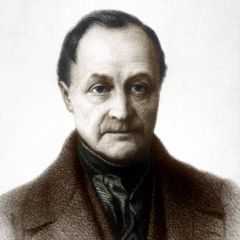
Auguste Comte
|
1798-1857; France "Father of Sociology"
-Empirical Research- based on -Sociology as the study of social statics (studies how principles of social order explain a society) and dynamics (How indiv. and society change over time) -How individuals and societies change over time -Coined the term sociology |
|
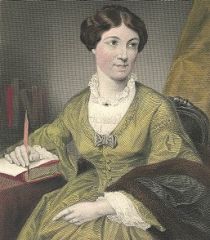
Harriet Martineau
|
1802-1876; England; Comte's translator
-Feminist and strong opponent of slavery denounced aspects of capitalism for being alienating and degrading -Concerned with industrialization and dangerous work conditions for women and children -Found that women in the U.S. were socialized to be subservient and dependent rather than equal marriage partners -Was dismissed for being too radical |
|
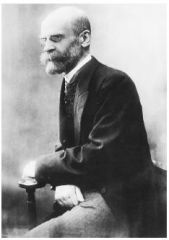
Emile Durkheim
|
1858-1917; France - how people can be indiv. and in society
-Believed sociology must study social facts- aspects of social life, external to the individual that can be measured -Facts can be measured by examining demographic characteristics like age, residence, population size by observing every day behavior and how people relate to one another -He focused on the Division of Labor- how people define themselves in a society that depends on interaction |
|
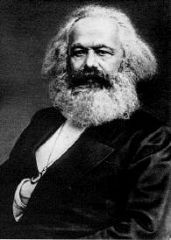
Karl Marx
|
1818-1883; Germany Conflict theorist
-Most influential social scientist ever -Tried to explain changes in society during the Industrial Revolution -Believed that economic issues produce divisiveness rather than social solidarity -Focused on capitalism- the economic system in which the ownership of the means of production (land,money) is in private hands -Haves and have not's |
|
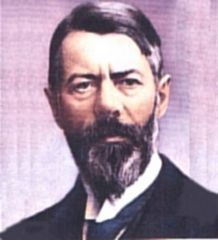
Max Weber
|
1864-1920; Germany
-Rejected the marxist view that economics explained society. Instead he focused on a value free sociology-understanding behavior from a subjective point of view. -Economic factors were important but ideas, religious values, ideologies and charismatic leaders were just as as important |
|
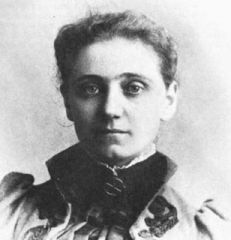
Jane Addams
|
1860-1935; U.S.
-Social worker- founded Hull House -leader in women's suffrage movement -First American women to be awarded Nobel Peace Prize -Experienced much discrimination |
|
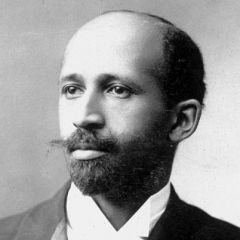
W.E.B Du Bois
|
1863-1963; U.S.
-Prominent black sociologis -First african American to receive a Ph.D from harvard -Founded the NAACP -Discussed the "color line' |
|
|
Sociological Theory
|
Theory-statement of how and why specific facts are related. Guide sociologists.
|
|
|
Functionalism
|
*structural functionalism*
-Maintains that society is a complex system of interdependent parts that work together to ensure survival; stucture -Analyzes what specific systems are working or not working, diagnoses problems and devises solutions to restore balance. 2 functions -manifest - intended and recognized (marriage ceremony to unite an a new family unit) -Latent - unintended and unrecognized (marriage ceremony to signal "hands off", to redefine family boundaries) |
|
|
Conflict Theory
|
-Shows how inequality creates conflict and causes change
-Examines how groups disagree, struggle over power and compete for scarce resourses -Asks: Who wins? Who loses? -Feminism ties in with this |
|
|
Symbolic-Interactionism
|
-Studies how individuals in everyday interaction (knowledge, ideas, beliefs, attitudes) construct reality; Micro level perspective
-Understands that people are by nature, symbolic with one another. Useful for understanding other people, improving communication, cross culture relations. -We act differently in social settings, adjust our behaviors as we act...office vs. bar |
|
|
Feminist Perspective
|
-Is within conflict theory
-Characterized by the tension and struggle between women and a patriarchal society -Effective in challenging discrimination |
|
|
Scientific Method
|
Steps in the research process that include careful data collection, exact measurements, accurate recording and analysis of the findings, thoughtful interpretation of results.
|
|
|
Variable
|
Characteristics that can change in value or magnitude under different conditions
Independent- determines or has an effect dependent- the outcome |
|
|
Reliability
|
-Consistency
-same measure produces similar results time after time |
|
|
Validity
|
-Degree to which a measure is accurate and really measures what it claims to measure
|
|
|
Reasoning
|
Deductive- begins with a theory, predictions or general principles that is then tested through data collection
Inductive- begins with specific observations, followed by data collection, a general conclusion or theory construction |
|
|
Population and sample
|
Pop- well-defined group of people
Sample- A portion of the pop Probability sample- one for which an equal chance of being selected because the selection process is random. Non-probability sample- sample for which little or no attempt is made to get representation cross section of the pop |
|
|
Qualitative research
|
non-numerical
|
|
|
Quantitative research
|
-numerical
|
|
|
Social research/investigation
|
-Examines human behavior
-Be nosy; evaluate -Looking for "truths" NOT opinions or culture biases -Challenge common sense Important because: -Get knowledge to understand life (divorce patterns) -Myth busters (majority of homeless not addicts) -Sharpens critical thinking -Helps us make decisions How to research 1. Data collection 2. Exact measurement 3. Accurate recording 4. Analysis of findings 5. Interpretation of results *Focus - Relationship between variables |
|
|
Operationalizing your variables
|
How you are going to measure your variables
|
|
|
Correlation
|
Link between two or more variables; Correlation DOESN'T mean there is a third factor CAUSING change in both variables
Social scientist have to deal with the human effect |
|
|
Culture
|
-Learned and shared behaviors, beliefs, attitudes, values and material objects that characterize a particular group of or society. Interchangeable with society
Culture is learned Culture is transmitted from one generation to the next Culture is shared Culture is adaptive and always changing |
|
|
Society
|
Group of people who have lived and worked together long enough to become an organized population and to think of themselves s a social unit. Interchangeable with culture
|
|
|
Material Culture
|
Consists of tangible objects that members of society make, use and share
|
|
|
Nonmaterial culture
|
The shared set of meanings that people in society use to interpret and understand the world
|
|
|
Symbols
|
Anything that carries a particular meaning recognized by people who share a culture. (thumbs up means "up yours" in Greece)
-Tattooing ect. -Can unify or divide a society -Can change over time |
|
|
Language
|
-System of symbols that allows people to communicate with one another.
-Varies from culture to culture -Impacts how we think about and act toward each other (uses of black and white)(Gender; "Okay guys" to start a class" is acceptable) -70,000 languages globally |
|
|
Value
|
-Culturally defined standards (what is desirable, good and beautiful)
-Change over time and from culture to culture |
|
|
Beliefs
|
Specific thoughts or ideas that people hold to be true
|
|
|
Norms
|
Rules and expectations by which society guides the behavior of it's members (saying bless you after a sneeze)
|
|
|
More
|
-Norms that are widely observed and have a great moral significance (right and wrong)
|
|
|
Folkway
|
-Norm that draws the line between right and rude (wearing tuxedo t-shirt to a black tie event)
|
|
|
Sanctions
|
Attempts by society to regulate peoples thoughts and behaviors
|
|
|
Subculture
|
-Group of people whose ways of thinking, feeling and acting differ somewhat from those of the larger society (based on ethnicity, religion, politics, ect)
|
|
|
Counterculture
|
-Strongly appose those widely accepted values within society
-Can be negative or positive (Ku Klux Klan or Amish) |
|
|
3 causes of culture change
|
-Invention - creating new cultural elements (telephone or airplane)
-Discovery - Recognizing and better understanding something already existing (x-rays or DNA) Diffusion - Spread of culture traits (jazz music or english language); product worked on in multi cultures |
|
|
Cultural Relativism
|
The practice of judging a culture by its own standards
-requires you to be completely open to a new culture and put aside your own standards and values |
|
|
Ethnocentrism
|
-Judging another culture by the standards of your own
-Ofen generates misunderstanding and conflict |
|
|
Cultural Imperialism
|
-Involves the culture values and products of one society influencing or dominating another society
|
|
|
Pop Culture
|
-Functionalists - focus on culture as a cement that binds society
-Conflict theorists - Argue that culture can generate enormous inequality -Feminists - Focus on gender differences -Interactionist - Study how people interact and transmit culture |
|
|
Socialization
|
-Lifelong social experience by which people develop their human potential and learn culture
-Behavior is learned not just biological Purpose -teaches us role taking -It controls our behavior -It transmits culture to the next generation |
|
|
Nature
|
From root meaning "Nature"
-Innate/Biological -Due to heredity -Fairly fixed -"born this way" or women are "emotional" or cultures are "simple minded"...This is an Ethnocentric view |
|
|
Nurture
|
From root meaning "Nourished"
-Learned -Psychological, social, cultural -Due to environment -Nurture is our nature -Adult behavior can influence a child's biological makeup (Abuse can affect the brain) |
|
|
Internalization
|
Process of learning cultural behaviors and expectations so deeply that we assume they are correct and accept them without question.
|
|
|
The major theories and socialization
|
Functionalism - understanding the purpose of socialization
Social learning theory - how people learn new attitudes, beliefs and behaviors through social interaction -Symbolic interaction - how the self emerges through social interaction (mirror, we see ourself how others see us) |
|
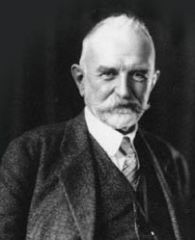
George H. Mead: Theory of the Social Self
|
1863-1931
-Developed theory of SOCIAL BEHAVIORISM to explain how social experience develops an individuals personality -SELF is central to theory, part of an indiv. personality composed of self awareness and self image -Self not there at birth; it develops -Self only develops with social experience (interaction with others, exchange of symbols Self has two parts 1.part of self is active and spontaneous 2.the way we imagine others see us |
|
|
Looking glass self
|
-self image based how we think others see us
|
|
|
Generalized other
|
-term used to refer to widespread cultural norms and values we use as a references in evaluating ourselves; changes with social experience
|
|
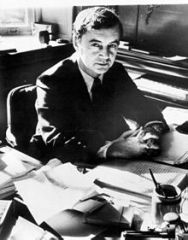
Erving Goffman
|
-Analyzed how interaction differs in different settings in adulthood
|
|
|
Impression management
|
-We present ourselves in a favorable light while downplaying anything negative
-We attempt to control our settings, appearance and manner |
|
|
Agents of socialization
|
Family - Biggest factor
Others - Teachers, mentors, peer group and mass media |
|
|
Race and Class socialization
|
-Plays large part in shaping personality
|
|
|
Life course
|
-social construction
-Problems and transitions of life involve learning -Experience varies greatly based on when you lived |
|
|
Resocialization
|
The process of unlearning old way of doing things and adopting new attitudes, values, norms and behavior.
-usually involves being confined in prison or mental hospitals |
|
|
The Hawthorne effect
|
Term that refers to a change in a subjects behavior caused by the awareness of being studied.
|
|
|
Sociological perspective
|
The point of view of sociology that sees general patterns of society in the lives of particular people.
|
|
|
Sociological imagination
|
Coined by C. Wright Mills
-Ability to see the intersection between lives and larger influences. -The big picture |

